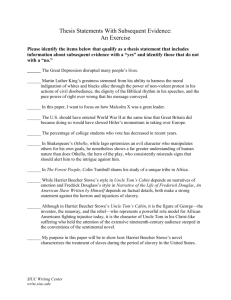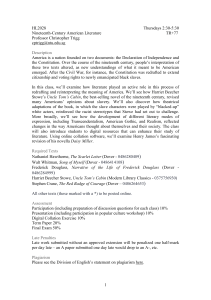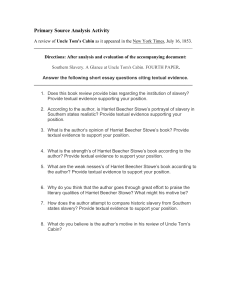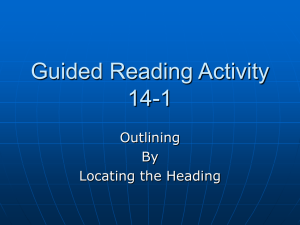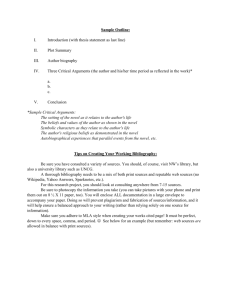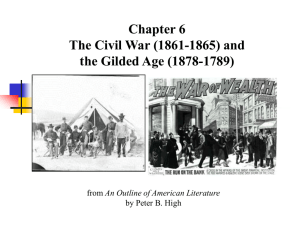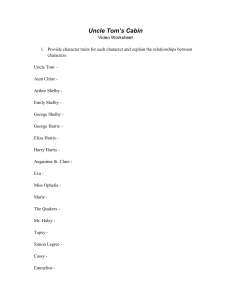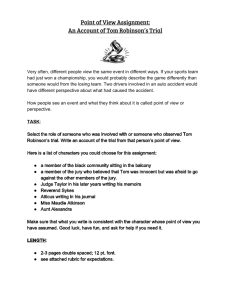Literature Changes History
advertisement
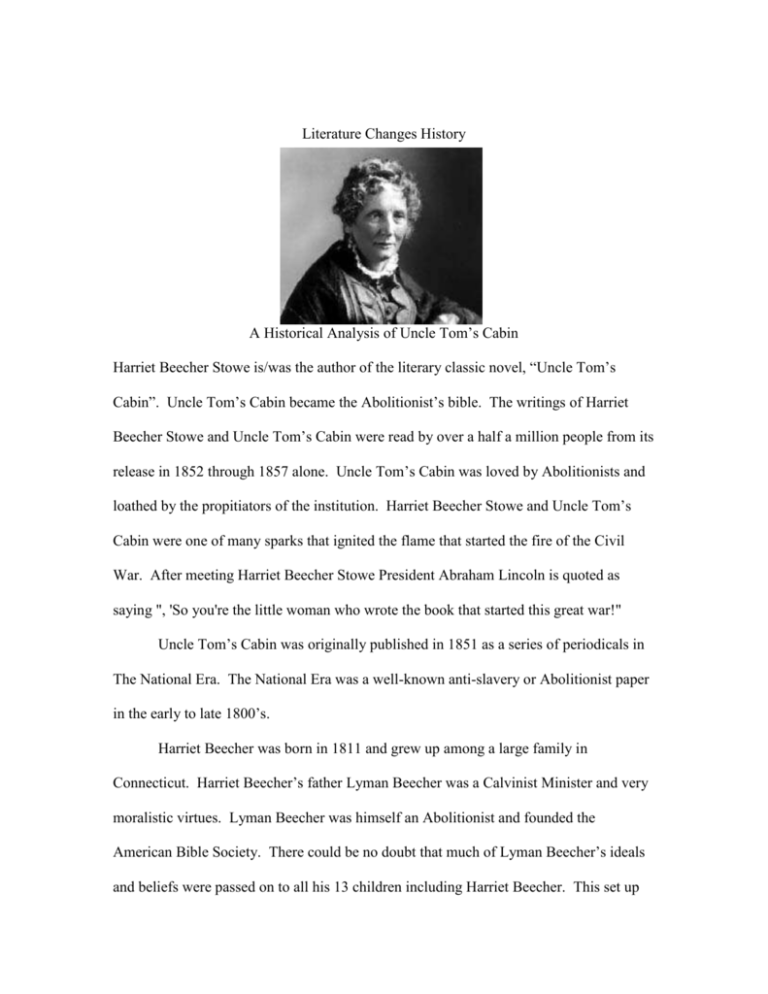
Literature Changes History A Historical Analysis of Uncle Tom’s Cabin Harriet Beecher Stowe is/was the author of the literary classic novel, “Uncle Tom’s Cabin”. Uncle Tom’s Cabin became the Abolitionist’s bible. The writings of Harriet Beecher Stowe and Uncle Tom’s Cabin were read by over a half a million people from its release in 1852 through 1857 alone. Uncle Tom’s Cabin was loved by Abolitionists and loathed by the propitiators of the institution. Harriet Beecher Stowe and Uncle Tom’s Cabin were one of many sparks that ignited the flame that started the fire of the Civil War. After meeting Harriet Beecher Stowe President Abraham Lincoln is quoted as saying ", 'So you're the little woman who wrote the book that started this great war!" Uncle Tom’s Cabin was originally published in 1851 as a series of periodicals in The National Era. The National Era was a well-known anti-slavery or Abolitionist paper in the early to late 1800’s. Harriet Beecher was born in 1811 and grew up among a large family in Connecticut. Harriet Beecher’s father Lyman Beecher was a Calvinist Minister and very moralistic virtues. Lyman Beecher was himself an Abolitionist and founded the American Bible Society. There could be no doubt that much of Lyman Beecher’s ideals and beliefs were passed on to all his 13 children including Harriet Beecher. This set up Harriet Beecher’s opinions and beliefs towards slavery (among other civil rights issues). In 1832 when Harriet Beecher was 21 her father moved the family to Cincinnati, Ohio. Lyman Beecher had accepted a position at the Theological Seminary (in Cincinnati, Ohio). It was only a short time (four years) after that in 1836 that Harriet Stowe was married. Harriet Beecher became Harriet Beecher Stowe (Beecher Stowe) by marrying Calvin Stowe. Beecher Stowe’s marriage to Calvin Stowe were times filled with love and friendship. However, they to had many difficulties as people do throughout their marriage. Calvin Stowe’s employment as a Biblical scholar often times kept him away from the home. He earned a very modest income that often times left the family near poverty. Beecher Stowe was often times left as the only care provider for her children. When Calvin Stowe was home he was often in poor health. It was in Ohio that Beecher Stowe became accustomed to the institution of slavery. Being raised of high morals she was unwilling to accept the idea of one person owning another. The story of Uncle Tom’s Cabin lays out the institution of slavery and the horrors that encapsulate it. Beecher Stowe was a woman and an outspoken Abolitionist of her time. There were not very many women; people man or women for that matter that were willing to risk what Beecher Stowe had. She spoke out against slavery and all the evils of the dreaded institution. Beecher Stowe explains how the “Underground Railroad” worked and the trials many African American had to take to escape their horrors. Often by running the slaves would find themselves in a position even worse than the one they had run from. If caught the slave was to be beaten, maimed, cut, slashed, whipped, sold to an owner who do more of the same (maybe worse) and killed. To many people living in the southern United States (“Slave States”) Uncle Tom’s Cabin was just another form of anti-slavery propaganda. “Ralph Waldo Emerson once called it the book that "encircled the globe" because of the furor that arose over its subject matter.” (www.womenwriters.net) Uncle Tom’s Cabin is a novel of slavery. The book describes in great detail the issues that surround slavery. The story takes place in the southern United States as well as other portions of the country. Ohio is one of the “free-states” that large portions of the story transpire. Uncle Tom’s Cabin is a story of slavery, however, it is much more than that. This story speaks of the brutal treatment of slaves, the selling, auctioning, parting of siblings and even the stealing of children from their mothers’ arms. “Stowe's main goal with Uncle Tom's Cabin was to convince her large Northern readership of the necessity of ending slavery.” (Sparknotes.com) The Fugitive Slave Act was passed in 1850. Not long after this historical event Harriet Beecher Stowe began publishing her works from Uncle Tom’s Cabin. “The Fugitive Slave Act was part of the group of laws referred to as the "Compromise of 1850." In this compromise, the antislavery advocates gained the admission of California as a free state, and the prohibition of slave trading in the District of Columbia. The slavery party received concessions with regard to slaveholding in Texas and the passage of this law. Passage of this law was so hated by Abolitionists, however, that its existence played a role in the end of slavery a little more than a dozen years later. This law also spurred the continued operation of the fabled Underground Railroad, a network of over 3,000 homes and other "stations" that helped escaping slaves travel from the southern slave-holding states to the northern states and Canada.” (http://www.project 21.org) Under this act slave owners were allowed legally to search and/or hunt down their run away slaves. If a slave ran away from his/her master and fled to a “free state”, the owner of said slave was able to bring him/her back by any means (the owner found) necessary. Often times this meant certain death for the run-away. Death to many slaves was a very viable option and a tempting way out of a dire situation. The first publications of Uncle Tom’s Cabin were published in 1851. The book sold 10,000 copies in the first week and over 300,000 in the first year of its original publication. Harriet Beecher Stowe was born Harriet Elisabeth Beecher and grew up in Connecticut with her parents, six brothers and one sister (Harriet Beecher being the seventh child). Her father was a very strict Calvinistic Protestant Minister. He emphasized equal rights and treatment for all. Beecher Stowe’s mother died at the age of four. “Her aunt, Harriet Foote, influenced deeply Stowe's thinking, especially with her strong belief in culture.”(http://www.kirjasto.sci.fi) The combination of her father, her aunt and the short time with her mother lead the way for Beecher Stowe’s religious and cultural beliefs. Harriet Beecher Stowe was a woman of integrity with strong ethical beliefs. The Story: Uncle Tom’s Cabin is the life story of Uncle Tom. Uncle Tom was the most faithful and hard working slave a slave owner could ask for. (That statement is very unethical and demeaning in its self.) Uncle Tom enters his life as a slave. Uncle Tom grew up as a slave in the state of Kentucky. Mister and Misses Shelby are the rightful owners of Uncle Tom. A large, broad-chested, powerfully mad man, of a full glossy black, and a face whose truly African features were characterized by an expression of grave and steady good sense, united with much kindliness and benevolence. There was something about his whole air self-respecting and dignified, yet united with a confidence and humble simplicity.” (Uncle Tom’s Cabin, Introduction, page XII) Due to some financial hardships the Shelby’s are forced to sell Uncle Tom and another of their slaves. The other slave they sold was Harry an infant son to Eliza. “Eliza had been brought up by her mistress, from girlhood, as a petted and indulged favorite.” (Uncle Tom’s Cabin, Chapter 2, page 15) Eliza over hears Mr. Shelby speaking to Mrs. Shelby of the sale of her son Harry and Uncle Tom. After listening to the conversation she takes Harry and runs to the Uncle Tom of the news. Uncle Tom at first is very hesitant with believing Eliza. Tom tells Eliza that is she must go than she must, however, Tom chooses to stay and face the truth. “"No, no -- I an't going. Let Eliza go -- it's her right! I wouldn't be the one to say no -- 'tan't in natur for her to stay; but you heard what she said! If I must be sold, or all the people on the place, and everything go to rack, why, let me be sold. I s'pose I can b'ar it as well as any on 'em," he added, while something like a sob and a sigh shook his broad, rough chest convulsively. "Mas'r always found me on the spot -- he always will. I never have broke trust, nor used my pass no ways contrary to my word, and I never will. It's better for me alone to go, than to break up the place and sell all. Mas'r an't to blame, Chloe, and he'll take care of you and the poor” (Uncle Tom’s Cabin, chapter 5, page 45) The good natured, faithful and honest Tom feels that it will be in everyone’s best interest that he does not run of with Eliza and her little Harry. So Tom stays at his Cabin and bids Eliza farewell and good luck. Eliza runs off unknowing of what her the outcome of her decision will hold. She is unsure were to go only knowing that she has to head north to the free-states, more specifically Ohio. Eliza does manage to cross the icy Ohio River to Ohio. After reaching Ohio Eliza has to face the fact that Harry’s owner will follow. Due to the before mentioned “Fugitive Slave Act” Harry’s new owner has the right to cross into Ohio in search of his property. Once found he can return to his home with Harry in his custody. Luckily for Eliza and Harry they have the help of many people acting as supporters of the Under Ground Railroad. “The Underground Railroad was neither "underground" nor a "railroad," but was a loose network of aid and assistance to fugitives from bondage. Perhaps as many as one hundred thousand enslaved persons may have escaped in the years between the American Revolution and the Civil War. In 1990, Congress authorized the National Park Service to conduct a study of the Underground Railroad, its routes and operations in order to preserve and interpret this aspect of United States history. This study includes a general overview of the Underground Railroad, with a brief discussion of slavery and abolitionism, escape routes used by slaves, and alternatives for commemoration and interpretation of the significance of the phenomenon.” (http://www.nps.gov/undergroundrr/contents.htm) It is with the network that Eliza and Harry are able to escape and elude their pursuers. With the help of so many good people they do make it to freedom, freedom for them is not found within the borders of the United States, however, in order for them to taste the freedom we take for granted they had to travel the long distance to Canada. ““Who can speak the blessedness of that first day of freedom? Is not the sense of liberty a higher and a finer one than any of the five? To move, speak and breathe, -- go out and come in unwatched, and free from danger! Who can speak the blessings of that rest which comes down on the free man's pillow, under laws which insure to him the rights that God has given to man? How fair and precious to hat mother was that sleeping child's face, endeared by the memory of a thousand dangers! How impossible was it to sleep, in the exuberant possession of such blessedness! And yet, these two had not one acre of ground, -- not a roof that they could call their own, -- they had spent their all, to the last dollar. They had nothing more than the birds of the air, or the flowers of the field, -- yet they could not sleep for joy. "O, ye who take freedom from man, with what words shall ye answer it to God?"” (Uncle Tom’s Cabin, chapter 37, page 420 quoting John Philpot Curran (17501817), Irish orator and judge who worked for Catholic emancipation.) Tom’s life takes on a much different, however, just as uncertain path as Eliza and Harry’s. The slave trader Mister Haley takes Tom away from the only home he knows in Kentucky. Haley is a type of person who would take advantage of any situation or person he is put in contact with. When visualizing Haley I found a quote that summarizes my views of him. “We all know what a slave trader is like–an evil man with a bald head and a bullwhip, flogging starving men on the galleys, largely to gratify his own sadism, until such time as Charlton Heston throws him overboard” (http://www.aslan.demon.co.uk/colston.htm) Haley claims that he is only trying to earn an honest living, however, his idea as honest is morbid to most. As far as good slave owning families go (if there is/was a sort of thing) Tom was purchased by one of the best and most loving. At the auction (human slave auction) Tom comes in contact with a little lady by the name of Evangeline St. Clare. Eva as she likes to be called is the daughter of Augustine St Clare. “Augustine St. Clare was the son of a wealthy planter of Louisiana. The family had its origin in Canada. Of two brothers, very similar in temperament and character, one had settled on a flourishing farm in Vermont, and the other became an opulent planter in Louisiana. The mother of Augustine was a Huguenot French lady, whose family had immigrated to Louisiana during the days of its early settlement. Augustine and another brother were the only children of their parents. Having inherited from his mother an exceeding delicacy of constitution, he was, at the instance of physicians, during many years of his boyhood, sent to the care of his uncle in Vermont, in order that his constitution might, be strengthened by the cold of a more bracing climate.” (Uncle Tom’s Cabin, chapter 15, page 167) Augustine next to Eva (and Mrs. Shelby) is one of the most caring and loving people throughout the reading of Uncle Tom’s Cabin. Augustine is very fortunate for his wealth and feels inclined to use it doing good. Augustine is the type of person who would (if he could) by all the slaves and keep them under his care. It is from Augustine attitude and morals that Eva receives hers. Eva loves people and holds no prejudice to race or religion. She thinks of all people as creatures of god. “"But, mamma, isn't God her father, as much as ours? Isn't Jesus her Saviour?"” (Uncle Tom’s Cabin, chapter 26, page 311) Marie St Clare, Eva’s mother and Augustine's wife has a very opposite opinion to that of the rest of her family. She thinks of slaves as property, to be done with as property. Her views and those of Eva and Augstine's are in constant conflict. Marie seems to be the stereotypical southern female slave owner. Marie is a woman born into wealth and likes to use her wealth for personal gain (such as owning slaves). “Marie never had possessed much capability of affection, or much sensibility, and the little that she had, had been merged into a most intense and unconscious selfishness; a selfishness the more hopeless, from its quiet obtuseness, its utter ignorance of any claims but her own. From her infancy, she had been surrounded with servants, who lived only to study her caprices; the idea that they had either feelings or rights had never dawned upon her, even in distant perspective. Her father, whose only child she had been, had never denied her anything that lay within the compass of human possibility; and when she entered life, beautiful, accomplished, and an heiress, she had, of course, all the eligibles and non-eligibles of the other sex sighing at her feet, and she had no doubt that Augustine was a most fortunate man in having obtained her. It is a great mistake to suppose that a woman with no heart will be an easy creditor in the exchange of affection. There is not on earth a more merciless exactor of love from others than a thoroughly selfish woman; and the more” (Uncle Tom’s Cabin, chapter 15, pages 169170) Marie is a always self involved, looking for sympathy or complaining about one thing or another. Marie is the mistress; however, Augustine is the master of the household. “Tom fell into a good home. Very little is asked of him by the St Clare’s. In fact his primary duty it to fill the wants and needs of Eva. Tom thinks of Eva as his daughter better yet as an angel of god. “Tom, who had the soft, impressible nature of his kindly race, ever yearning toward the simple and childlike, watched the little creature with daily increasing interest. To him she seemed something almost divine; and whenever her golden head and deep blue eyes peered out upon him from behind some dusky cottonbale, or looked down upon him over some ridge of packages, he half believed that he saw one of the angels stepped out of his New Testament.” (Uncle Tom’s Cabin, chapter 14, page 160) Tom as a slave really couldn’t have it much better than he did with the St Clare’s. He was nicely clothed, well fed and had his own humble apartment. However, as so many good things to this had to come to an end. Little Eva was a sickly child. She wouldn’t let on as to so for quite on long time. Once she did, however, there was a shock wave felt throughout the St Clare servants. Eva was the nicest little girl that anyone could as for. Eva would always greet everyone with the same respect regardless of who they were. Eva did pass away one dark night. This left everyone who came in contact with her very distressed. The most distressed was her father, Augustine. Augustine’s entire life revolved around his daughter; Eva was Augustine’s life. “"Who knows anything about anything?" said St. Clare, his eyes wandering dreamily, and speaking to himself. "Was all that beautiful love and faith only one of the ever-shifting phases of human feeling, having nothing real to rest on, passing away with the little breath? And is there no more Eva, -- no heaven, -- no Christ, -nothing?"” (Uncle Tom’s Cabin, chapter 27, pages 327-328) It is not too long after Eva’s death that Augustine informs Tom that he is going to grant him his freedom. As you could imagine Tom is overwhelmed. . This catch’s Augustine by a bit of surprise. He asks Tom why is he so happy, Augustine seems a bit irritated that Tom wants to leave. “"Well, Tom," said St. Clare, the day after he had commenced the legal formalities for his enfranchisement, "I'm going to make a free man of you; -- so have your trunk packed, and get ready to set out for Kentuck." The sudden light of joy that shone in Tom's face as he raised his hands to heaven, his emphatic "Bless the Lord!" rather discomposed St. Clare; he did not like it that Tom should be so ready to leave him. "You haven't had such very bad times here, that you need be in such a rapture, Tom," he said drily. "No, no, Mas'r! 'tan't that, -- it's bein' a free-man! that's what I'm joyin' for." "Why, Tom, don't you think, for your own part, you've been better off than to be free?" "No, indeed, Mas'r St. Clare," said Tom, with a flash of energy. "No, indeed!" "Why, Tom, you couldn't possibly have earned, by your work, such clothes and such living as I have given you." "Knows all that, Mas'r St. Clare; Mas'r's been too good; but, Mas'r, I'd rather have poor clothes, poor house, poor everything, and have 'em mine, than have the best, and have 'em any man's else, -- I had so, Mas'r; I think it's natur, Mas'r."” (Uncle Tom’s Cabin, chapter 28, pages 331-332) So, Augustine naturally believes that as soon as Tom can he will leave him (the St Clare’s) Tom assures Augustine, however, that he will not leave his side until he (Augustine) finds god (Christianity). “"Not while Mas'r is in trouble," said Tom. "I'll stay with Mas'r as long as he wants me, -- so as I can be any use." "Not while I'm in trouble, Tom?" said St. Clare, looking sadly out of the window.... "And when will my trouble be over?" "When Mas'r St. Clare's a Christian," said Tom. "And you really mean to stay by till that day comes?" said St. Clare, half smiling, as he turned from the window, and laid his hand on Tom's shoulder. "Ah, Tom, you soft, silly boy! I won't keep you till that day. Go home to your wife and children, and give my love to all." "I 's faith to believe that day will come," said Tom, earnestly, and with tears in his eyes; "the Lord has a work for Mas'r."” (Uncle Tom’s Cabin, chapter 28, page 332) Tom’s freedom would not come from the ink of Augustine St Clare’s pen however. Augustine on his way into a café comes in contact with two men both of whom seem heavily intoxicated. These two men start fighting amongst themselves. Augustine in attempts to break up this fight is stabbed. The injury Augustine suffers turns out to be a fatal one. Augustine dies that night with Tom by his side. “When St. Clare breathed his last, terror and consternation took hold of all his household. He had been stricken down so in a moment, in the flower and strength of his youth! Every room and gallery of the house resounded with sobs and shrieks of despair.” (Uncle Tom’s Cabin, chapter 29, page 346) As a result of Augustine’s death Marie, Augustine’s wife, decides to sell the property all have (including their servants) and move north. Marie doesn’t keep Augustine’s promise to Tom granting him his freedom. Instead all the St Clare slaves are sold and inventoried at a Slave Warehouse. (How could any person dream of such a dreaded place, what a despicable concept!)? Now Tom is sold off to a very brutal owner. This owner, Master Legree, reminds me of the very person who brought about slavery. He treats his servants/slaves as dirt or dogs, rather less than dogs. It is will all his brutality and anger that Legree end the life of Uncle Tom. Legree in a rage beats Tom to death. In Tom’s dying breathe he ask for forgiveness for two of people that treated him so bitterly while under ownership of Legree. “"Poor critters!" said Tom, "I'd be willing to bar' all I have, if it'll only bring ye to Christ! O, Lord! give me these two more souls, I pray!" That prayer was answered!” (Uncle Tom’s Cabin, chapter 40, page 448) This story is not with out its own irony. Only two days after Tom’s near fatal beating does George Shelby come to buy Tom and bring him back to their (The Shelby’s) place in Kentucky. Mr. Shelby finds Tom unconscious in an old shed. Mr. Shelby begs and pleads for Tom to wake up. “"O, dear Uncle Tom! do wake, -- do speak once more! Look up! Here's Mas'r George, -- your own little Mas'r George. Don't you know me?"”(Uncle Tom’s Cabin, chapter 31, page 451) George Shelby is too late however, for Uncle Tom does die in that very shed. Tom died were he was left to die, left to die in a shed! Tom’s death is not in vein however. Upon return to his home George Shelby grants his slaves/servants their freedom. That includes Tom wife, Aunt Chloe and the rest of the Shelby servants. I feel that the target audience or the reader that Beecher Stowe was trying to reach was the American public in general. She wanted to show and inform the general public that slaves of the south were real people. These people can not be treated as property under our (The American) Constitution. Beecher Stowe wanted everyone to know that it was just the fault of the southern states for slavery. She emphasized that is was the American people as a whole, whether from the North or the South, for allowing this crime to take place. Beecher Stowe was very successful with the book and it further launched her writing career. However, Uncle Tom’s Cabin was written off in some of the South, and ridiculed by southern newspapers and periodicals. “It is a caricature of slavery. It selects for description the most odious features of slavery--the escape and pursuit of fugitive slaves, the sale and separation of domestic slaves, the separation of husbands and wives, parents and children, brothers and sisters. It portrays the slaves of the story as more moral, intelligent, courageous, elegant and beautiful than their masters and mistresses; and where it concedes any of these qualities to the whites, it is to such only as are, even though slaveholders, opposed to slavery. Those in favor of slavery are slave-traders, slave-catchers, and the most weak, depraved, cruel and malignant of beings and demons.” (The Southern Press Review, 1852) The Southern Press Review wanted the readers of Uncle Tom’s Cabin to think of the book as a joke? The Southern Literary Messenger Review attacked Beecher Stowe for Uncle Tom’s Cabin. This newspaper has the odasity to attack Beecher Stowe’s credibility. “But she has chosen to employ her pen for purposes of a less worthy nature. She has volunteered officiously to intermeddle with things which concern her not--to libel and vilify a people from among whom have gone forth some of the noblest men that have adorned the race--to foment heart-burnings and unappeasable hatred between brethren of a common country, the joint heirs of that country's glory--to sow, in this blooming garden of freedom, the seeds of strife and violence and all direful contentions.” (The Southern Literary Messenger Review, October 1852) It is easy to see the southern views and prespective of Uncle Tom’s Cabin. Most the people off the south, at least the large plantation owners and/or owners of large populations of slaves didn’t want to believe what they were reading. They didn’t want to believe they were doing what they were reading. So instead of trying to improve on the situation they chose to ignore it. The views and opinions of the north varied greatly from their southern counter-parts. “So great and good a thing has Mrs. Stowe here accomplished for humanity, for freedom, for God, that we cannot refrain from applying to her sacred words, and exclaiming, "Blessed art thou among women!"” (The National Era) Fredrick Douglass was a former (escaped) slave and leader in the Abolitionist Movement. Beecher Stowe asked Douglass for his insight into slavery. Beecher Stowe did not go about writing Uncle Tom’s Cabin blindly. She asked advice from the best. Douglass was one of the very few blacks that could read and write. It was for this that he was able to write his own autobiography, “The Life and Times of Fredrick Douglass”. Douglass also was the publisher of the “North Star” a newspaper that advocated Abolitionism “From 1847 to 1863, escaped slave and abolitionist Frederick Douglass (1817-1895) published the North Star with the aid of money and a press provided by British philanthropists.” (Loc.gov) One could only wonder what direction the Abolitionist Movement would have went had it lacked either one of these two people. Harriet Beecher Stowe and Uncle Tom’s Cabin were one of many sparks that ignited the flame that started the fire of the Civil War. Works Cited American Reviews of Uncle Tom’s Cabin The National Era http://www.iath.virginia.edu/utc/reviews/rere01at.html The Southern Literary Messenger http://www.iath.virginia.edu/utc/reviews/rere24at.html The Southern Press 1852 http://www.iath.virginia.edu/utc/reviews/rere27at.html Aslan.demon.co.uk http://www.aslan.demon.co.uk/colston.htm Harriet Beecher Stowe: “A Little Bit of a Woman” http://www.chfweb.com/smith/harriet.html By Barbara Smith Kirjasto.sci.fi http://www.kirjasto.sci.fi/hbstowe.htm Loc.gov http://www.loc.gov/exhibits/african/afam006.html National Geographic Online – The Underground Railroad http://www.nationalgeographic.com/features/99/railroad/ Nps.gov http://www.nps.gov/undergroundrr/contents.htm Project21.org http://www.project21.org/FugitiveSlaveAct.html Sparknotes.com http://www.sparknotes.com/lit/uncletom/context.html Uncle Tom’s Cabin – Online Edition – University of Virginia http://etext.lib.virginia.edu/etcbin/toccernew?id=StoCabi&tag=public&im ages=images/modeng&data=/texts/english/modeng/parsed&part=0 By Harriet Beecher Stowe Uncle Tom’s Cabin – Signet Classic By Harriet Beecher Stowe Womanwriters.net http://www.womenwriters.net/domesticgoddess/UTC.htm ‘
